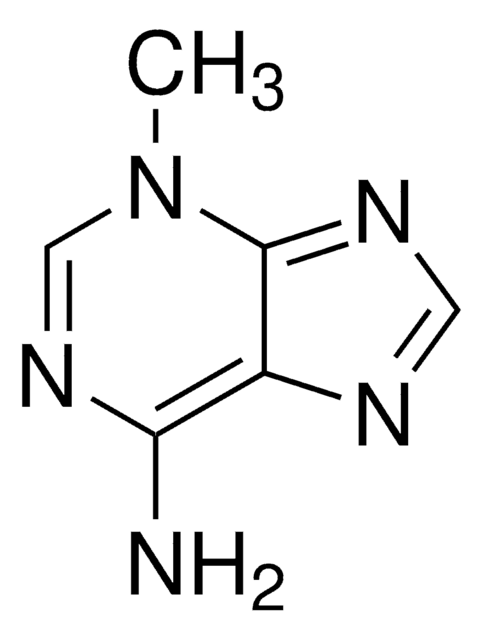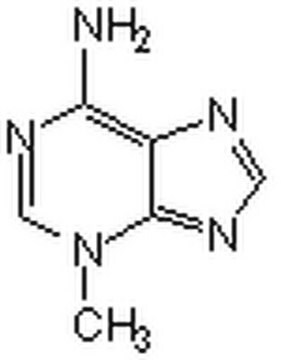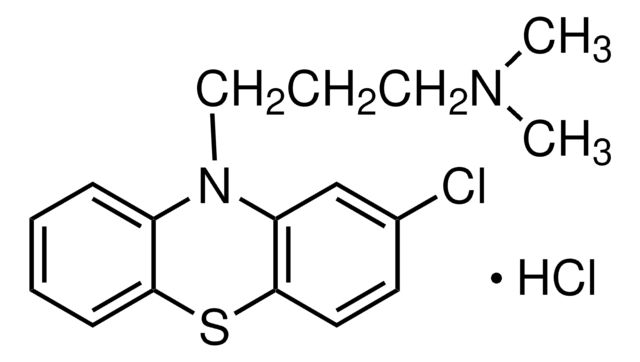SAE0107
3-Methyladenine Ready made solution
≥98% (HPLC), 7.5mg/ml (50mM) in MES buffer, Autophagy inhibitor
Synonym(s):
3-MA, 6-Amino-3-methylpurine, autophagy inhibitor
Sign Into View Organizational & Contract Pricing
All Photos(1)
About This Item
UNSPSC Code:
12352202
NACRES:
NA.51
Recommended Products
Assay
≥98% (HPLC)
form
liquid
concentration
7.5 mg/mL
shipped in
ambient
storage temp.
−20°C
Related Categories
General description
3-Methyladenine (3-MA) is a methylated derivative of adenine that has been used as an In vivo marker for the methylation of DNA. 3-Methyladenine and 7-methylguanine are the two main N-methylpurines formed in DNA upon exposure to methylating agents. 3-MA is removed from damaged DNA via the DNA base excision repair pathway, which begins with the enzyme N-methylpurine DNA glycosylase. The dependence of 3-MA repair on nucleotide excision repair in mammalian cell lines has been studied.3-MA have been widely used as autophagy inhibitor based on its inhibitory effect on class I and class III PI3K activity, which is known to be essential for induction of autophagy. 3-MA blocks class I PI3K persistently, whereas its suppressive effect on class III PI3K is transient, understanding the dual role of 3-MA in autophagy thus suggests that caution should be exercised in the application of 3-MA in autophagy study.
Furthermore, 3-MA is also capable of making the reduction of lymphocyte number caused by chronic stress rebound, implying that inhibition of autophagy can rescue chronic stress-induced immunosuppression.
Autophagy has been reported to play an important role in the 3, 4-Methylenedioxymethamphetamine MDMA-induced neurotoxicity in the mixed neuronal-glial primary culture and it was found that 3-MA ameliorate MDMA-induced autophagy, SERT loss, HPA axis dysfunction, and depressive behaviors.
Furthermore, 3-MA is also capable of making the reduction of lymphocyte number caused by chronic stress rebound, implying that inhibition of autophagy can rescue chronic stress-induced immunosuppression.
Autophagy has been reported to play an important role in the 3, 4-Methylenedioxymethamphetamine MDMA-induced neurotoxicity in the mixed neuronal-glial primary culture and it was found that 3-MA ameliorate MDMA-induced autophagy, SERT loss, HPA axis dysfunction, and depressive behaviors.
Application
3-Methyladenine (3-MA) is used to inhibit and study the mechanism of autophagy (lysosomal self-degradation) and apoptosis under various conditions. 3-MA inhibits autophagy by blocking autophagosome formation via the inhibition of type III Phosphatidylinositol 3-kinases (PI-3K). For use as an autophagy inhibitor, 3-MA is typically used at a concentration of 5mM.
Preparation Note
3-Methyladenine ready made solution is provided at 50mM (7.5mg/mL) concentration in MES buffer.
It is recommended to store 3-methyladenine readymade solution at -20C.
In case percipitates are formed upon thaw, use sonication and heat to get the product back into solution.
It is recommended to avoid freeze thaw cycles.
When stored properly 3-Methyladenine readymade solution should be stable for 2 years.
It is recommended to store 3-methyladenine readymade solution at -20C.
In case percipitates are formed upon thaw, use sonication and heat to get the product back into solution.
It is recommended to avoid freeze thaw cycles.
When stored properly 3-Methyladenine readymade solution should be stable for 2 years.
Storage Class Code
12 - Non Combustible Liquids
WGK
WGK 2
Flash Point(F)
Not applicable
Flash Point(C)
Not applicable
Certificates of Analysis (COA)
Search for Certificates of Analysis (COA) by entering the products Lot/Batch Number. Lot and Batch Numbers can be found on a product’s label following the words ‘Lot’ or ‘Batch’.
Already Own This Product?
Find documentation for the products that you have recently purchased in the Document Library.
Venkatesh P Thirumalaikumar et al.
Autophagy, 17(9), 2184-2199 (2020-09-25)
In nature, plants are constantly exposed to many transient, but recurring, stresses. Thus, to complete their life cycles, plants require a dynamic balance between capacities to recover following cessation of stress and maintenance of stress memory. Recently, we uncovered a
Our team of scientists has experience in all areas of research including Life Science, Material Science, Chemical Synthesis, Chromatography, Analytical and many others.
Contact Technical Service






